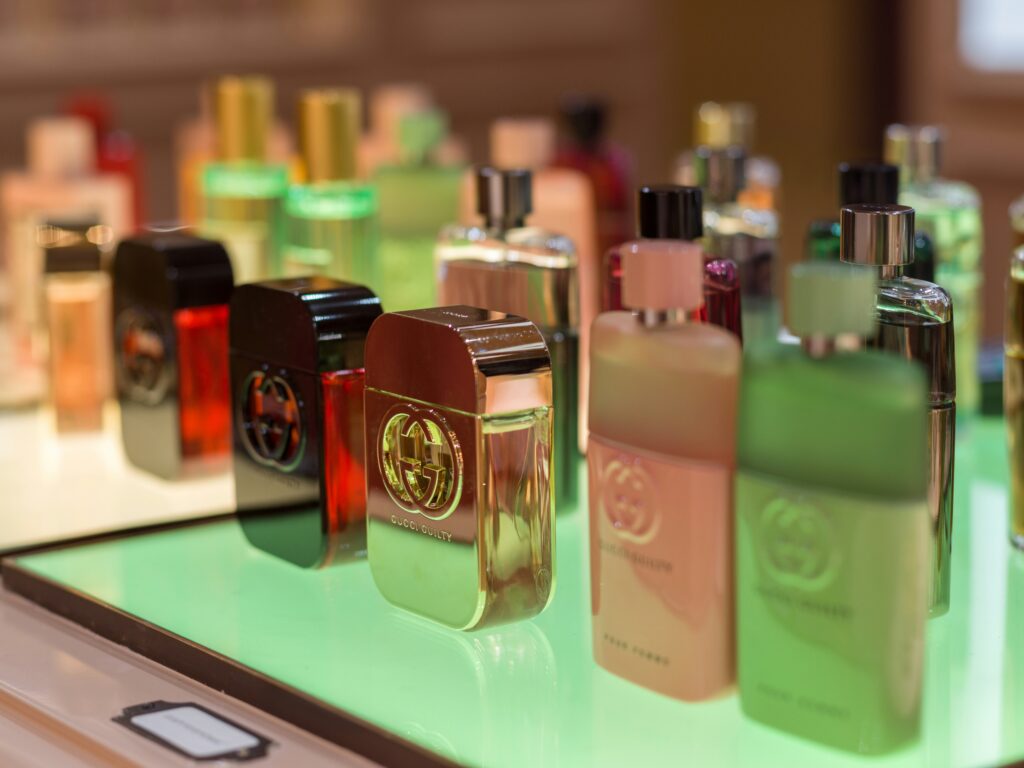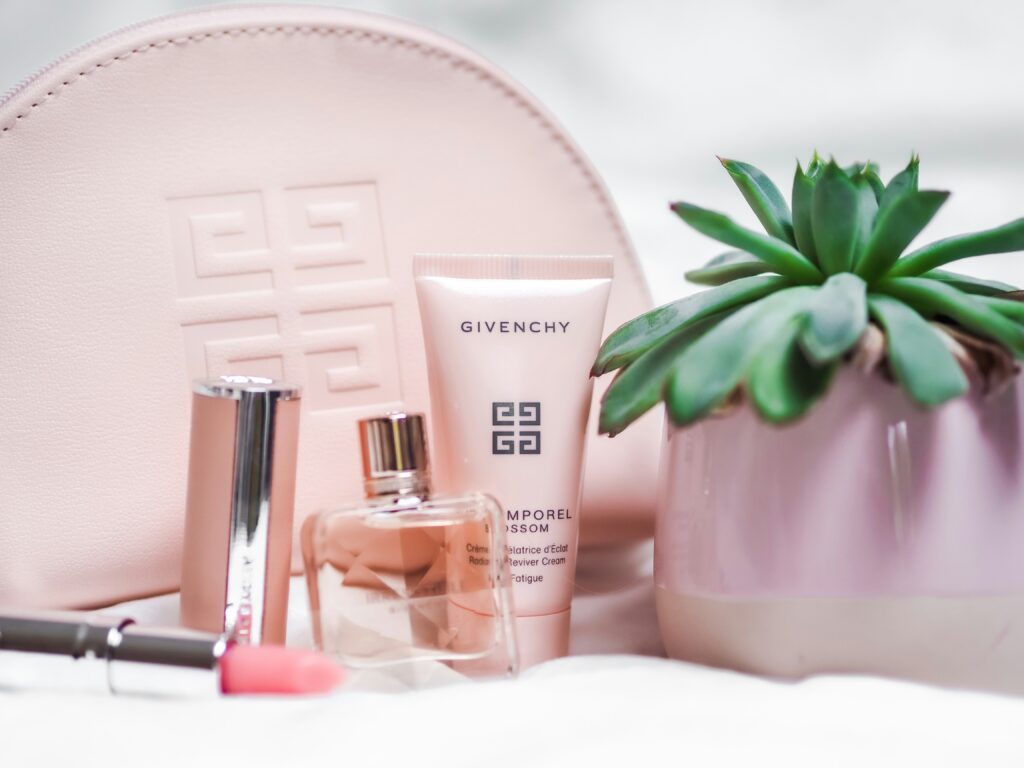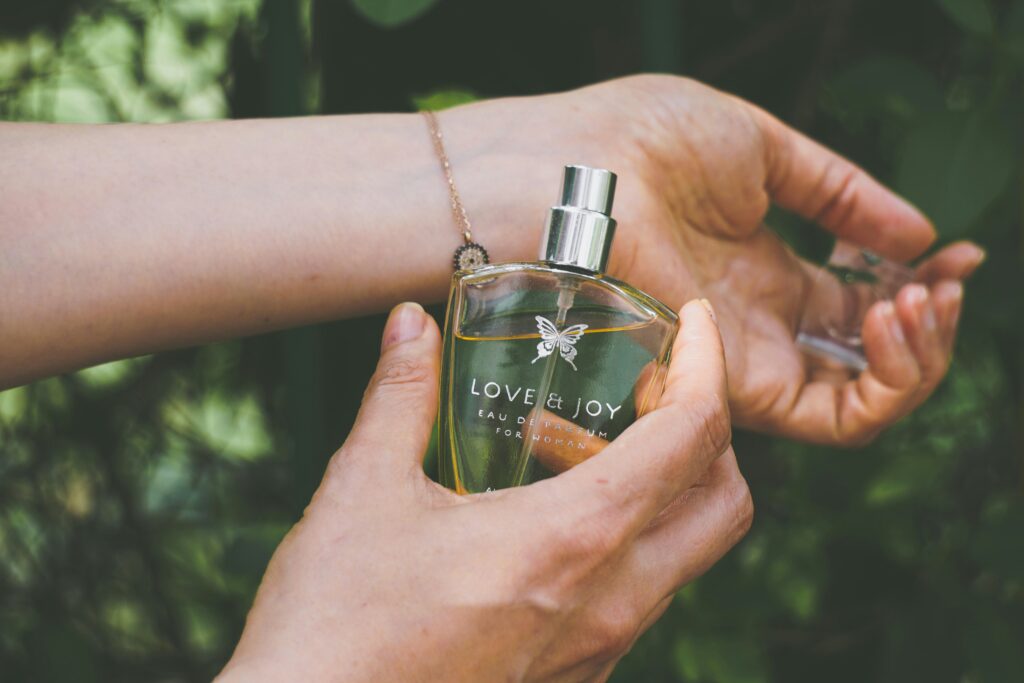“It’s a common question in the world of perfumery, but the answer is complex.”
Here are five factors that could be affecting how long you can smell your fragrance.
1. Olfactory Fatigue: Your Brain Adapts to Your Scent
Olfactory fatigue, also known as nose blindness, is a fascinating phenomenon that plays a crucial role in how we perceive scents. When you first apply a perfume, the fragrance is fresh and strong. You notice its various notes, from the top to the base, as they unfold over time. However, after a while, you may notice that the scent seems to fade, even though others around you can still smell it. This is not because the perfume has disappeared but because your brain has adapted to it.
Our nervous system, the body’s command center, is designed to prioritize new and potentially important stimuli. This was essential for survival in our evolutionary past, where detecting a new smell could mean identifying food, danger, or an approaching predator. When our brain encounters a new scent, it pays close attention to it, analyzing and categorizing it. But once the scent is familiar, the brain deems it less important, and its sensitivity to it diminishes. This is why a new perfume smells so captivating at first, but after wearing it for a while, you might not notice it as much.
This adaptation can be frustrating, especially when you’ve invested in a fragrance that you love and want to enjoy throughout the day. You might be tempted to reapply the perfume, thinking it has worn off, but in reality, it’s still there. The perfume’s molecules are still present on your skin, emitting their scent, but your brain has filtered it out as non-essential information.
To counteract olfactory fatigue, consider applying your perfume in places where your nose won’t constantly be exposed to it. For example, instead of spraying it directly on your neck, try applying it to your wrists, behind your ears, or even on your clothes. This distance from your nose can help reduce the likelihood of becoming nose-blind to your scent. Additionally, switching up your fragrances can keep your nose engaged. If you wear the same perfume every day, your brain will quickly adapt, but if you alternate between different scents, you’re more likely to continue noticing them.
Another interesting tip is to take short breaks from your perfume. If you step outside for fresh air or enter a different environment where your fragrance isn’t present, your brain gets a break from the continuous exposure. When you return, you may notice your scent more strongly again.
Understanding olfactory fatigue can help you better appreciate your perfumes. It’s not that your fragrance isn’t long-lasting; it’s that your brain is incredibly efficient at filtering out what it considers background noise. By being mindful of this process and adjusting how and where you apply your perfume, you can continue to enjoy your favorite scents throughout the day without feeling the need to over-apply.
2. Perfume Preferences: The Type of Fragrance Matters
The type of perfume you prefer plays a significant role in how long the scent lasts on your skin. Fragrances are composed of various notes that interact with each other to create the overall scent profile. These notes are often categorized into top, middle (or heart), and base notes, each with its own characteristics and longevity. Understanding these categories can help you choose a perfume that aligns with your expectations for how long it should last.
Top notes are the initial scents you smell when you first apply a perfume. These are typically light, fresh, and volatile, meaning they evaporate quickly. Common top notes include citrus fruits like lemon, bergamot, and grapefruit, as well as light florals like lavender and jasmine. Because of their volatility, top notes tend to fade within 15 to 30 minutes after application. While they provide an immediate burst of freshness, they are not meant to last long.
Heart notes, also known as middle notes, emerge as the top notes begin to fade. These notes form the core of the fragrance and give it depth and character. Heart notes are usually composed of more complex and less volatile ingredients like spices, florals, and some fruits. Common heart notes include rose, ylang-ylang, cinnamon, and pepper. These notes can last on the skin for up to two hours, providing the main body of the perfume.
Base notes are the foundation of the fragrance and are the last to emerge as the heart notes dissipate. These notes are typically rich, deep, and long-lasting. They include ingredients like woods (sandalwood, cedarwood), resins (frankincense, myrrh), and musks. Base notes can linger on the skin for several hours, sometimes even all day. They are responsible for the longevity of the fragrance and often contribute to its lasting impression.
Your preference for certain types of perfumes will influence how long the scent lasts on your skin. If you enjoy light, fresh, and citrusy scents, you may find that your fragrance doesn’t last as long because these notes are more volatile. To extend the life of these perfumes, you may need to reapply them throughout the day. Alternatively, you could layer your fragrance with matching scented lotions or body oils, which can help lock in the scent for longer.
On the other hand, if you prefer deeper, richer scents with prominent base notes, you’re likely to experience longer-lasting fragrance. These perfumes are often described as having a strong sillage, which means the scent trail they leave behind is noticeable to others. Stronger perfumes, like those with heavy woody, ambery, or musky notes, tend to have a more enduring presence and may last all day with just a single application.
Your skin chemistry also plays a role in how long a fragrance lasts. Dry skin, for example, may cause a perfume to fade more quickly because it lacks the natural oils that help retain scent. Oily skin, on the other hand, can hold onto fragrance longer, as the oils create a barrier that slows down evaporation. Knowing your skin type and how it interacts with different fragrances can help you choose perfumes that will last longer on you.
In summary, the type of perfume you choose—whether it’s light and fresh or deep and rich—will dictate its longevity. Understanding the olfactory pyramid and how different notes behave on your skin can help you make more informed choices when selecting a fragrance. Whether you prefer the fleeting freshness of citrus or the lingering warmth of woods, there’s a perfume out there that suits both your preferences and your expectations for longevity.

3. Concentration: Extract, Eau de Parfum, or Eau de Toilette
When it comes to perfume, one of the most important factors influencing its longevity is its concentration. Perfume concentration refers to the ratio of fragrance oils to alcohol and other ingredients in the formulation. The higher the concentration of fragrance oils, the stronger and longer-lasting the scent. There are several levels of concentration, with the most common being Eau de Toilette (EdT), Eau de Parfum (EdP), and Extract (also known as Parfum or Extrait de Parfum). Each of these has its own characteristics, which can significantly affect how long the fragrance lasts on your skin.
Eau de Toilette (EdT) is the least concentrated of the three, typically containing 10-12% fragrance oils. Because of its lighter concentration, EdT is often more affordable and has a more subtle, refreshing scent. However, this also means that it doesn’t last as long on the skin. Eau de Toilette is designed for those who prefer a lighter fragrance that doesn’t linger too long, making it ideal for daytime wear or for those who like to switch up their scent throughout the day. On average, an EdT may last anywhere from 2 to 4 hours before it needs to be reapplied.
Eau de Parfum (EdP) is more concentrated than EdT, typically containing 20-25% fragrance oils. This higher concentration gives Eau de Parfum a richer, more intense scent that lasts longer on the skin. Most EdPs can last between 4 to 6 hours, sometimes even longer, depending on the ingredients used and your skin chemistry. Eau de Parfum is a popular choice because it strikes a balance between longevity and cost, making it suitable for both day and night wear. It’s versatile enough to be worn for various occasions, from casual outings to formal events.
Extract (Parfum or Extrait de Parfum) is the most concentrated form of perfume, with over 25% fragrance oils. This high concentration results in a very potent scent that can last all day, sometimes even into the next day. Because of its intensity, only a small amount is needed to achieve a lasting fragrance. Extracts are often more expensive due to the high concentration of fragrance oils, but they are also the most luxurious and long-lasting option. They are typically worn for special occasions or by those who prefer a strong, enduring scent.
The concentration of a perfume not only affects its longevity but also its projection and sillage. Projection refers to how far the scent radiates from your skin, while sillage refers to the trail the fragrance leaves behind as you move. Higher concentrations like EdP and Extract generally have a stronger projection and sillage, making them more noticeable to those around you. This can be both a positive and a negative, depending on your personal preference and the setting in which you’re wearing the perfume.
When choosing a perfume, it’s important to consider both the concentration and the occasion for which you’ll be wearing it. If you’re looking for something subtle and refreshing for everyday wear, an Eau de Toilette might be the best choice. If you prefer a richer scent that lasts longer and makes a statement, Eau de Parfum or Extract could be more suitable. Keep in mind that higher concentrations are often more expensive, but they also provide more value in terms of longevity and potency.
In conclusion, the concentration of your perfume plays a significant role in how long it lasts on your skin. Whether you opt for the light and airy Eau de Toilette, the balanced and versatile Eau de Parfum, or the intense and long-lasting Extract, understanding these differences can help you choose the right fragrance for your needs. By selecting a concentration that matches your lifestyle and preferences, you can ensure that your perfume lasts as long as you want it to.

4. Partial Anosmia: Sensitivity to Specific Ingredients
Partial anosmia is a lesser-known factor that can significantly affect how long you perceive a fragrance to last. Anosmia is the inability to detect certain smells, and partial anosmia means that while you can smell most scents, you might not be able to detect specific ingredients within a fragrance. This condition can make it seem like a perfume has faded or disappeared when, in fact, it is still present, but your nose simply isn’t detecting one or more of its key components.
Our sense of smell is incredibly complex, and it’s influenced by numerous factors, including genetics, environment, and even age. Some people are born with a natural inability to detect certain smells, while others may develop this over time due to exposure to specific odors or chemicals. For example, some individuals may be unable to smell musk, a common ingredient in perfumes that provides a warm, long-lasting base note. If you have partial anosmia to musk, you might find that fragrances containing this ingredient seem to fade quickly or lack depth, even though others can still smell it.
The challenge with partial anosmia is that it can vary greatly from person to person. Some people might be anosmic to certain floral notes like lily or jasmine, while others might not detect woody or earthy scents like sandalwood or patchouli. This selective perception can make it difficult to find a fragrance that you fully enjoy, as some of the key ingredients might not be noticeable to you. It can also lead to the misconception that a perfume isn’t long-lasting, when in reality, your nose is just not picking up on certain aspects of the scent.
One way to identify if you have partial anosmia is to compare your perception of a fragrance with that of others. If you find that your friends or family can smell a perfume on you hours after you’ve applied it, but you can’t, partial anosmia could be the reason. Additionally, if you notice that certain types of perfumes consistently seem to fade quickly on you, it could be due to an inability to detect specific ingredients used in those fragrances.
Understanding your sensitivity to different ingredients can help you choose perfumes that work better with your olfactory senses. If you suspect that you have partial anosmia to certain notes, you might want to focus on fragrances that emphasize the ingredients you can detect. Perfume descriptions and reviews can be helpful in identifying the dominant notes in a fragrance, allowing you to select scents that are more likely to be noticeable and enjoyable for you.
There’s also the possibility of training your sense of smell to become more attuned to certain scents. While anosmia is often considered permanent, some studies suggest that repeated exposure to specific smells can help improve detection over time. This process, known as olfactory training, involves regularly sniffing a set of essential oils or other fragrant substances to help the brain learn to recognize and process those scents. While this may not completely cure partial anosmia, it could potentially enhance your ability to detect certain notes in perfumes.
In summary, partial anosmia is a condition that can significantly impact your experience with fragrances. If you find that some perfumes seem to disappear quickly or lack complexity, it could be due to an inability to detect certain ingredients. By becoming aware of your scent sensitivities and choosing fragrances that align with them, you can enjoy a more consistent and lasting perfume experience. Additionally, exploring olfactory training might help you expand your scent perception over time, allowing you to appreciate a wider range of fragrances.

5. Skin Chemistry: How Your Skin Affects Scent
Skin chemistry is one of the most personal and unique factors that influence how long a fragrance lasts on your skin. No two people have the exact same skin chemistry, which means that the same perfume can smell different and last for varying amounts of time on different individuals. Understanding your skin’s characteristics—such as its type, moisture level, and pH balance—can help you better predict how a perfume will perform on you and why certain scents last longer than others.
One of the most significant aspects of skin chemistry is skin type, particularly in terms of oiliness and dryness. Oily skin tends to retain fragrances better than dry skin because the natural oils act as a binding agent for the perfume’s molecules. This means that if you have oily skin, your fragrance is likely to last longer and project more strongly. The oils on your skin slow down the evaporation of the perfume, allowing the scent to linger for hours. On the other hand, dry skin lacks this natural moisture, causing fragrances to evaporate more quickly. If you have dry skin, you might find that your perfume fades faster than you’d like.
To address this, it’s important to properly hydrate your skin before applying perfume. Using a good moisturizer, preferably unscented, can help create a base that locks in the fragrance. Some people also choose to apply a thin layer of petroleum jelly or a fragrance-free oil to the areas where they plan to spray perfume. This technique helps the scent adhere to the skin and prolongs its longevity.
Another factor is the pH level of your skin, which can affect how a fragrance develops and smells over time. The pH level of human skin typically ranges from 4.5 to 5.5, making it slightly acidic. However, variations can occur due to factors like diet, skincare products, and overall health. A higher or lower pH level can alter the way perfume ingredients react with your skin, potentially changing the scent and its lasting power. For instance, a perfume that smells sweet and floral on one person might take on a more sour or bitter note on someone with a different skin pH.
Body temperature is another component of skin chemistry that plays a role in fragrance longevity. Areas of the body that are warmer, such as pulse points (wrists, neck, behind the ears), tend to amplify and diffuse the scent more rapidly. This can be both an advantage and a disadvantage, depending on your preference. While the warmth can enhance the projection of the fragrance, it might also cause it to fade faster. If you want your perfume to last longer, consider applying it to cooler areas of your body, such as the back of your knees or the inside of your elbows, where it won’t evaporate as quickly.
Sweat and environmental factors also interact with your skin chemistry to affect fragrance longevity. In hot and humid conditions, sweat can dilute and wash away perfume, making it fade faster. On the other hand, in cooler and drier climates, your skin might retain fragrance better. Your lifestyle, including your diet and how much water you drink, can also influence your skin’s hydration level and, consequently, how well your perfume lasts.
Finally, it’s worth noting that skin chemistry can change over time. Hormonal changes, aging, and shifts in your skincare routine can all impact how your skin interacts with fragrance. This means that a perfume you loved and that lasted all day in your 20s might not have the same effect in your 30s or 40s. Being aware of these changes and adjusting your fragrance choices accordingly can help you maintain a consistent and enjoyable scent experience.
In conclusion, skin chemistry is a complex and individual factor that significantly affects how long a perfume lasts on your skin. By understanding your skin type, pH level, and other related factors, you can make more informed choices about the fragrances you wear and how you apply them. Hydrating your skin, applying perfume to cooler areas, and being mindful of environmental conditions are all strategies that can help you get the most out of your favorite scents.
Checklist for Buying Perfume:
- Know your skin type: Dry skin can make fragrances fade faster.
- Test before you buy: Fragrance can smell different on your skin compared to a blotter or someone else.
- Consider natural perfumes: They interact differently with your skin, offering a unique scent evolution.


